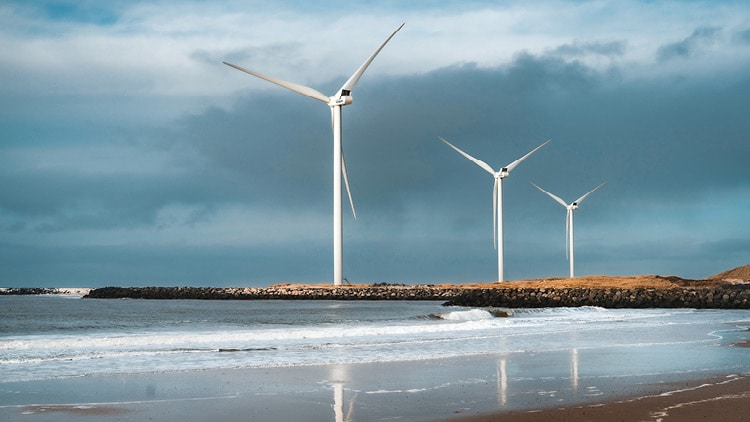How can Budget 2023 keep the climate challenge in focus during unprecedented times?
11 July, 2022
Tax policy is a critical lever available to the Government in our fight against climate change. Tax incentives to encourage investment in particular areas or the imposition of taxes to discourage certain behaviours and fund a just transition for all are critical aspects of tax policy in this context.
Against a backdrop of high inflation and the rapidly increasing cost of living, the Government has the challenging task in Budget 2023 of balancing our commitment to climate action with the requirement to allocate funding elsewhere in the economy.
However, critically, the impact of climate change on humanity will eclipse everything that has come before it so it must therefore remain at the top of the agenda.

In the period since Budget 2022, there has been a variety of positive developments that have either turned Ireland's commitment to decarbonisation into action or signed Ireland up to international commitments and agreements, such as those entered into as part of COP26. While the strategies and pathways are set for our 2030 targets, the implementation and action of these plans will ultimately determine our success or failure.
Following on from our detailed pre-Budget submission last year, this document highlights ideas the Government could add to its suite of potential tax measures, supports and/or funding to further support Ireland's decarbonisation journey.
Infrastructure and sustainable living
Developing infrastructure across transport, housing, energy and electric vehicle (EV) charging, in addition to encouraging green corporate and consumer behaviour, will be crucial to Ireland's transition to a more sustainable economy.
Private investment and entrepreneurship in sustainability initiatives
Public finance will not be sufficient to enable Ireland to meet its climate targets by 2030. Private investment plays a critical role in financing the transition to a green economy and the EU sustainable finance agenda ensures that it plays a central role in meeting our climate goals. We focus on two key sectors; offshore wind and ClimateTech/green technology.
Each of which forms an economic pillar for our future green economy and requires substantial private investment and/or will be driven by entrepreneurs.
Establishing Ireland as a 'green finance hub'
While climate change poses significant risks and challenges, there are also many opportunities. The Irish financial services sector is well-placed to be a key enabler in the net zero transition and to drive the change needed to deliver a more sustainable future. It is vital that Ireland continues to develop an environment that fosters the growth of sustainable finance and puts Ireland on course to be a leading centre for sustainable finance by 2025 (as set out in Ireland's Sustainable Finance Roadmap).
A holistic environmental tax and incentive system
Environmental taxes can act as a key deterrent and carbon tax is Ireland's most substantial environmental tax. It is legislated for up to 2030, when it will reach €100 per tonne. The application of these revenues is critical to a Just Transition. More broadly, the adoption of measures introduced at an EU level, namely the Carbon Border Adjustment Mechanism (CBAM) and the revisions to the Energy Taxation Directive, will provide much-needed certainty to impacted businesses. There also continue to be opportunities for improvements or extensions to the accelerated capital allowances regime.
The decarbonisation of the Irish aviation industry
The aviation industry has committed to achieving net zero by 2050 through the International Air Transport Association (IATA). Ireland, as the leading centre for aircraft leasing globally and home to Europe's largest airline, has the opportunity to take a leading role in the aviation sector's journey to net zero. The scale of change and innovation required to arrive at commercially viable solutions to achieve net zero is arguably the industry's biggest challenge. With the right support in place, Ireland is well-positioned to play a significant role both on a domestic and global scale.
The EU Just Transition Fund
Ireland is set to receive up to €84.5 million from the EU Just Transition Fund between 2021–2027. The Government will complement this funding with Exchequer resources. As carbon tax is on an upward trajectory until 2030, revenues generated will continue to be reinvested in ensuring a Just Transition. In response to the Russia/Ukraine war and the resulting energy crisis, the Government recently introduced a suite of targeted and universal supports focused on fuel poverty, which are welcome and needed at this time. Several areas continue to require attention to ensure a Just Transition.
Infrastructure and sustainable living
Tax measures to encourage positive corporate and consumer behaviour in the areas of transport, housing and the transition to EVs could include:
- A more flexible Tax Saver scheme, or a tax credit for employers who buy transport tickets for employees.
- Tax relief for interest on retrofit loans, incentivising landlords to retrofit rental properties, introducing a 'help to insulate' scheme, and stamp duty relief where the retrofit occurs shortly after purchase.
- Tax relief for interest on EV loans, tax relief for home charging points, and trade-in policies for vehicles in exchange for electric bikes.
Private investment and entrepreneurship
The offshore wind sector and ClimateTech/green technology sector will be key pillars for our transition to a green economy. It is critical that we unlock our potential in these areas:
- Certainty for developers of offshore wind is critical for securing inward investment to Ireland and allowing us to build our infrastructure. The areas in need of focus are the qualifying nature of grid connection costs, the application of participation exemption to pre-trading scenarios, a reintroduction of s468C TCA 97, capital allowances for the build out of port infrastructure and the expansion of the exemption for infrastructure projects under the interest limitation provisions. Furthermore, reducing the administrative burden of relevant contracts tax (RCT) and facilitating quicker value-added tax (VAT) refunds would be welcome developments.
- Ireland is a prime location for the development of ClimateTech companies and we must continue to invest in incentives to support and attract such companies to Ireland. The research and development (R&D) tax credit is one of the most valuable tax reliefs available to this sector alongside the Employment Incentive Investment Scheme (EIIS), which gives tax relief for investment in Irish indigenous businesses.
Establishing Ireland as 'Green Finance Hub'
As a hub for global green/sustainable financing, Ireland is uniquely placed to help drive the flow of private capital towards greener and more sustainable projects on a global scale. To further boost Ireland's position as a centre of excellence for sustainable finance, Ireland should consider the following:
- The introduction of a preferential rate of income/corporation tax for returns generated from sustainable investment products by Irish tax-resident investors and reducing the rate of investment undertaking tax (IUT) for Article 9 funds. The Irish financial services sector could benefit from significant positive publicity in promoting such initiatives with potentially very little loss of overall revenue to the Irish economy.
- The introduction of a territorial system of taxation would simplify Ireland's tax code and ultimately enhance the country's attractiveness as a destination for investment and as a location for global green/sustainable financing activities.
- There is an urgent need in the market for the development of software and data gathering systems that support the collection of reliable ESG data. As such, Ireland should consider the extension of the accelerated capital allowances regime to qualifying expenditure incurred by companies on investment in technology software solutions for ESG data management and reporting.
- Attracting and retaining local and international senior people with the requisite experience and skills is a necessary step in developing Ireland as a hub for global sustainable financing. In this regard, a new form of tax relief designed to incentivise senior employees of private investment companies to remain in Ireland or come to Ireland is required.
Holistic environmental tax and incentive system
The 'Fit for 55' package has resulted in significant changes in the approach to environmental taxes, namely CBAM and changes to the Energy Taxation Directive:
- The introduction of CBAM will equalise the cost of carbon between goods produced within the EU and those imported through the purchase of carbon certificates to help pave the way for a low-carbon economy. Guidance on CBAM and its introduction for businesses is needed as soon as possible, so that businesses have sufficient time to assess how they will report the emissions embedded within their products at the beginning of 2023.
- The Energy Taxation Directive is currently being updated. The proposed recast introduces a new tax rate structure to reflect the energy content and environmental impact of fuels and electricity.
Consideration could also be given to expanding the scope of corporate tax deductions to cover carbon offsets in the voluntary sector. This would limit the relief for the purchase of voluntary carbon credits to those sponsored by the State or other inter-governmental institutions or regulated commercial enterprises. It would also require recognised independent periodic verification, monitoring and reporting. Linking a corporate tax deduction to a requirement to report and reduce GHG emissions should encourage companies to measure GHG emissions in the entirety of their value chain and encourage a change in behaviour which is a critical step in Ireland's decarbonisation journey.
Decarbonising the Irish aviation industry
As the leading centre for aircraft leasing globally and home to Europe's largest airline, Ireland has the opportunity to take a leading role in the aviation sector's journey to net zero. Aviation is a hard-to-abate industry, meaning that the transition to carbon neutrality is critically dependent on actions taken today. Sustainable aviation fuel (SAF) is expected to be one core driver of the aviation sector's decarbonisation journey.
- We propose that tax relief under Section 486B be considered for investment into projects working on the development of new SAF technologies, as well as for SAF manufacturing/production projects.
- To ensure that Ireland maximises the opportunity to become an innovation hub for the development of SAF-enabling technologies, it is important that Ireland's holding company regime is equally as efficient as those of our European counterparts.
- Currently, one of the most significant barriers to the use of SAF is cost. To bridge this gap, we propose that a tax credit be provided to Irish distributors/manufacturers of SAF, which would be linked to predefined targets (such as greenhouse gas intensity reductions), with a higher credit for higher emissions reductions.
- To support Ireland's position as a global aircraft leasing hub, we propose extending the accelerated capital allowances regime under Section 285A to apply to energy efficient/sustainable fuel type aircraft.
Ensuring a Just Transition
In pursuing a just transition, some areas we expect or hope the Government to address in Budget 2023 include:
- The National Retrofit Plan is a key element of the Government's plans for economic recovery. The significant budgets now provided for retrofit will help stimulate the creation of high-quality jobs and support the development of supply chains for associated products and services.
- We expect the area of upskilling and reskilling our workforce to receive substantial funding to support the transition as employment and upskilling are critical in meeting our emissions targets and moving to a green economy.
- The transition for the agricultural sector is a critical aspect of Ireland's transition due to our reliance on the sector for economic, societal and cultural reasons. A comprehensive suite of funding and tax measures are needed to support and manage this transition.
- Ensuring the greatest possible levels of community ownership in all future renewable energy projects by encouraging communities to develop their own projects and requiring that developer-led projects make share offers to communities to encourage greater local involvement and ownership.
We are here to help you
Our energy and sustainability advisory and tax practices are here to assist you with any aspect of your journey towards a more sustainable and decarbonised future. Contact us today.







Menu